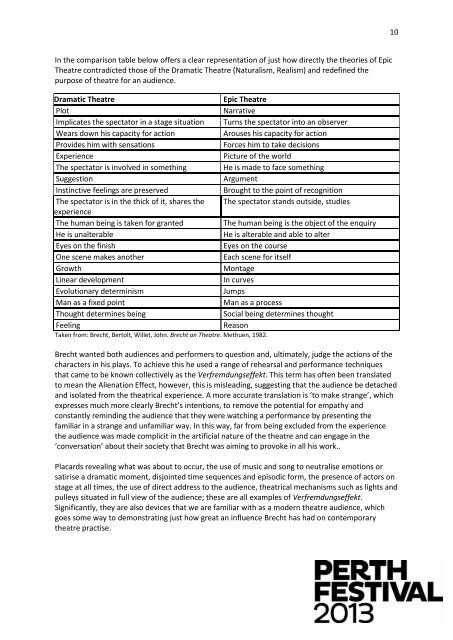THE THREEPENNY OPERA
THE THREEPENNY OPERA
THE THREEPENNY OPERA
Create successful ePaper yourself
Turn your PDF publications into a flip-book with our unique Google optimized e-Paper software.
In the comparison table below offers a clear representation of just how directly the theories of Epic<br />
Theatre contradicted those of the Dramatic Theatre (Naturalism, Realism) and redefined the<br />
purpose of theatre for an audience.<br />
Dramatic Theatre Epic Theatre<br />
Plot Narrative<br />
Implicates the spectator in a stage situation Turns the spectator into an observer<br />
Wears down his capacity for action Arouses his capacity for action<br />
Provides him with sensations Forces him to take decisions<br />
Experience Picture of the world<br />
The spectator is involved in something He is made to face something<br />
Suggestion Argument<br />
Instinctive feelings are preserved Brought to the point of recognition<br />
The spectator is in the thick of it, shares the<br />
experience<br />
The spectator stands outside, studies<br />
The human being is taken for granted The human being is the object of the enquiry<br />
He is unalterable He is alterable and able to alter<br />
Eyes on the finish Eyes on the course<br />
One scene makes another Each scene for itself<br />
Growth Montage<br />
Linear development In curves<br />
Evolutionary determinism Jumps<br />
Man as a fixed point Man as a process<br />
Thought determines being Social being determines thought<br />
Feeling Reason<br />
Taken from: Brecht, Bertolt, Willet, John. Brecht on Theatre. Methuen, 1982.<br />
Brecht wanted both audiences and performers to question and, ultimately, judge the actions of the<br />
characters in his plays. To achieve this he used a range of rehearsal and performance techniques<br />
that came to be known collectively as the Verfremdungseffekt. This term has often been translated<br />
to mean the Alienation Effect, however, this is misleading, suggesting that the audience be detached<br />
and isolated from the theatrical experience. A more accurate translation is ‘to make strange’, which<br />
expresses much more clearly Brecht’s intentions, to remove the potential for empathy and<br />
constantly reminding the audience that they were watching a performance by presenting the<br />
familiar in a strange and unfamiliar way. In this way, far from being excluded from the experience<br />
the audience was made complicit in the artificial nature of the theatre and can engage in the<br />
‘conversation’ about their society that Brecht was aiming to provoke in all his work..<br />
Placards revealing what was about to occur, the use of music and song to neutralise emotions or<br />
satirise a dramatic moment, disjointed time sequences and episodic form, the presence of actors on<br />
stage at all times, the use of direct address to the audience, theatrical mechanisms such as lights and<br />
pulleys situated in full view of the audience; these are all examples of Verfremdungseffekt.<br />
Significantly, they are also devices that we are familiar with as a modern theatre audience, which<br />
goes some way to demonstrating just how great an influence Brecht has had on contemporary<br />
theatre practise.<br />
10


